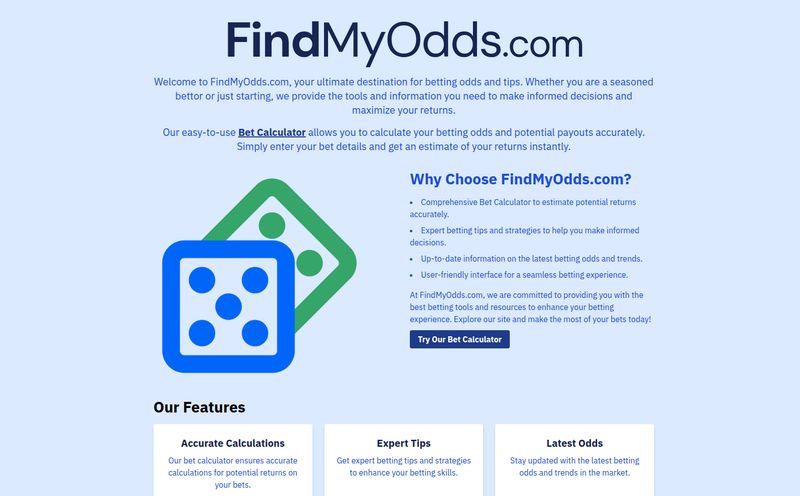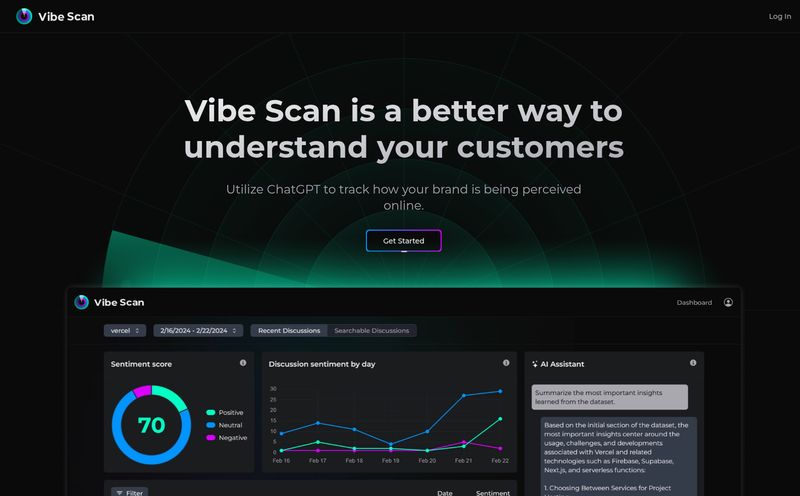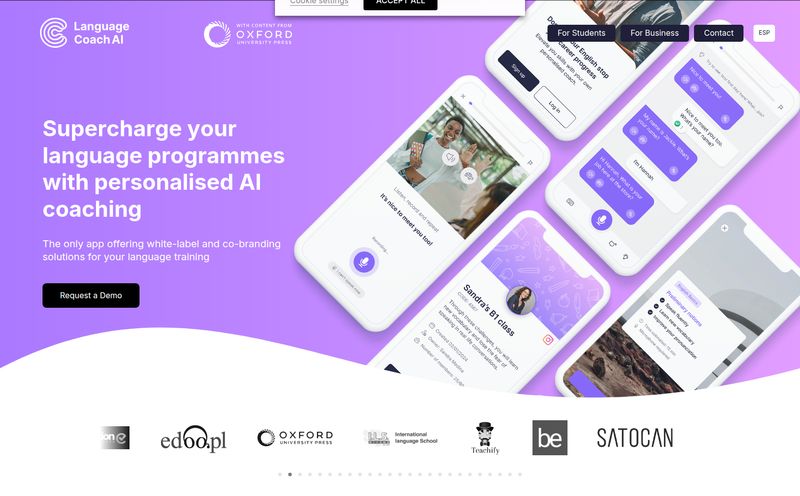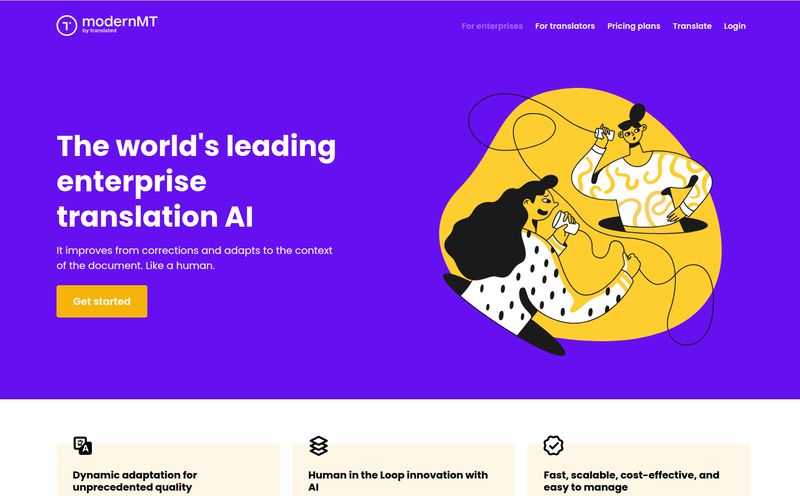The question I dread most every single day isn't "Did that keyword rank?" or "What's our CPC looking like?". It's the soul-crushing, creativity-draining, eternally-repeating question: "What's for dinner?" For years, my meal planning has been a chaotic dance between old favorites, desperate take-out menus, and the wilting vegetables in my fridge crying out for a purpose. It's a chore.
So, you can imagine my curiosity was piqued when I stumbled upon Nutrition AI. In the current gold rush where every startup is slapping an "AI" label on their product, I've become… let's call it healthily skeptical. We've got AI for writing, AI for coding, AI for art. Now, we've got an AI that wants to plan my breakfast, lunch, and dinner. Is this the digital sous-chef I've been dreaming of, or just another algorithm that's going to tell me to eat more kale? I had to find out.
First Impressions: What is Nutrition AI, Really?
Landing on the Nutrition AI homepage is refreshingly simple. There are no flashy videos or confusing pop-ups. It's clean, green, and gets straight to the point with a single, powerful question: "What is your goal?"
That's it. That’s the entry point. It's not asking for your life story, just your intention. Lose weight, follow a specific diet, improve health, etc. This, I can get behind. The core idea is that Nutrition AI acts as your personl nutritionist. You feed it your goals, and in return, it builds a complete, personalized nutrition plan. We're talking daily meal suggestions, full recipes with ingredients, detailed nutritional information, and even a shopping list to take the guesswork out of your grocery run. It’s all supposedly curated by a team of "AI nutritionists, cooks, and analysts." An interesting C-suite, for sure.
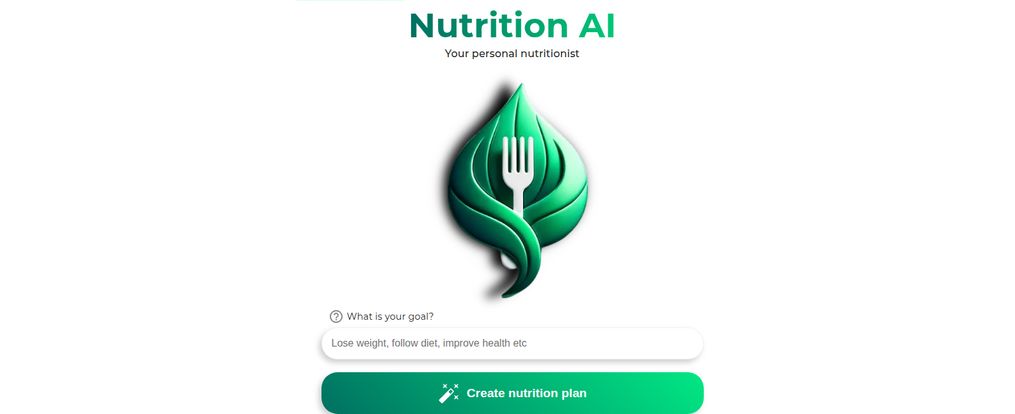
Visit Nutrition AI
How Nutrition AI Aims to Revolutionize Your Diet
It’s one thing to have a concept, it’s another to execute it. So, what’s actually under the hood? It seems to boil down to a few key promises.
Truly Personalized Meal Plans?
This is the big one. The platform doesn't just hand you a generic "7-Day Healthy Eating" PDF you could find anywhere online. The whole system is built around your input. Want to try a ketogenic diet but are sick of bacon and eggs? Trying to build muscle and need a high-protein plan? Or maybe you just want to explore Mediterranean cuisine. You tell the AI, and it gets to work, crafting a plan that supposedly fits your specific needs. It's like having a diet coach who doesn't charge by the hour and never gets tired of your questions.
From Recipes to Your Shopping List
For me, this is where the magic really happens. A meal plan is great, but a meal plan that also tells you how to cook the food and then writes your shopping list? That’s a game-changer. The friction between deciding to eat healthy and actually doing it often lives in the grocery store aisle. Nutrition AI's ability to generate a shopping list directly from your weekly meal plan is a massive time-saver. No more forgetting the cilantro or buying yet another jar of paprika you don’t need. It’s a simple feature, but it shows they understand the real-world frustrations of home cooking.
The "Expert" in the Machine
The platform also promises "expert advice." This is the part that gives me a slight pause. What does that mean? Is the AI pulling from a database of established nutritional science? Almost certainly. Is it able to provide the kind of nuanced, empathetic advice a human professional can? Probably not. I see this less as a replacement for a dietitian and more as a super-intelligent FAQ. It can give you the facts, figures, and macros, which for many people, is more than enough to get started and stay on track.
The Good, The Bad, and The Algorithmic
No tool is perfect, especially one powered by something as new and evolving as generative AI. After poking around and considering the possibilities, here’s my honest breakdown.
The Good Stuff is genuinely compelling. The level of personalization is a huge plus. The convenience of having your meals, recipes, and shopping list in one place is undeniable. It's a fantastic tool for anyone who feels overwhelmed by nutritional information and just wants a clear, actionable plan. It removes the decision fatigue from eating well. For busy professionals or fitness enthusiasts who live by their macros, this could be an incredibly powerful ally.
But there are some, let's say, caveats. My main concern is the classic "Garbage In, Garbage Out" principle. The effectiveness of your entire plan hinges on the quality of the information you provide. If you forget to mention your mild allergy to cashews, the AI isn't going to intuit that for you. It's not a mind reader. And then there's the question of algorithmic bias. What if the AI's training data has a weird American-centric view of food? Will it ever recommend jollof rice or beef rendang, or am I stuck with grilled chicken salads forever? A human nutritionist can adapt and understand cultural food preferences in a way an algorithm might struggle with. You have to take the recommendations with a grain of salt and use your own judgment—which, to be fair, you should be doing anyway.
So, How Much Does This AI Nutritionist Cost?
Ah, the million-dollar question. Or, hopefully, the $9.99/month question. Here’s where things get a bit weird. I went looking for a pricing page, ready to see the subscription tiers. And I found… a 404 error. The page simply wasn't there.
This could mean a few things. Maybe they're revamping their pricing. Maybe it's a temporary glitch. Or maybe they're operating on a different model entirely right now, perhaps in a beta phase. Honestly, it's a bit of a misstep. As a potential user, not being able to find pricing information is an immediate red flag. It creates uncertainty. I'm hoping they get this sorted out soon, because transparency is pretty important when you're asking people to trust you with their health.
Who is Nutrition AI Actually For?
So who should give this a shot, 404 page and all? In my opinion, Nutrition AI is perfect for a few types of people:
- The Busy Professional: You value your health but don't have hours to spend on Pinterest looking for recipes.
- The Fitness Optimizer: You track your macros and want a tool to help you hit your protein, carb, and fat goals without eating the same thing every day.
- The Diet Dabbler: You're curious about trying a new way of eating (like vegan, paleo, etc.) but don't know where to start.
- The Meal-Planning-Hater: You, like me, are just fundamentally tired of figuring out what to eat.
However, it’s probably not the right tool for someone with complex medical conditions, severe food allergies, or an eating disorder. In those cases, the nuanced guidance of a registered human dietitian is irreplaceable. This is a tool for wellness and convenience, not a medical device.
In the end, Nutrition AI is a fascinating example of where technology is headed. It's an attempt to solve a genuinely universal problem with a very 21st-century solution. While I have my reservations about relying too heavily on an algorithm for health advice, I can't deny the sheer convenience it offers. It’s a powerful organizational tool that could genuinely help a lot of people build healthier habits. I'll be keeping an eye on them, and hopefully, that pricing page comes back from the dead soon.
Frequently Asked Questions about Nutrition AI
- What is Nutrition AI?
- Nutrition AI is an online platform that uses artificial intelligence to create personalized nutrition plans. It provides users with daily meal suggestions, recipes, nutritional information, and shopping lists based on their individual health goals.
- How does Nutrition AI create a meal plan?
- It starts by asking for your primary goal (e.g., lose weight, follow a keto diet, improve general health). The AI then uses this information to generate a customized plan, pulling from a database of recipes and nutritional data to match your specific needs.
- Can I use Nutrition AI for specific diets like keto or vegan?
- Yes, absolutely. The platform is designed to accommodate a wide variety of dietary preferences and restrictions, including popular diets like keto, vegan, paleo, and Mediterranean, among others.
- Is Nutrition AI free to use?
- The pricing for Nutrition AI is currently unclear. At the time of this review, the pricing page on their website was not working, so it's difficult to say whether it is a free service, a subscription model, or something else.
- Is Nutrition AI better than a human nutritionist?
- It's best to think of Nutrition AI as a tool for convenience and organization, not a replacement for a human expert. For complex health issues, severe allergies, or medical advice, you should always consult a registered dietitian or doctor. The AI is great for general wellness and hitting macro goals.
- What if I have food allergies?
- The system's effectiveness depends on the information you provide. While you can likely input your allergies, it's crucial to be thorough and always double-check the AI-generated recipes and ingredient lists to ensure they are safe for you. Don't rely on it blindly.
References and Sources
- The official website for the tool discussed: Nutrition AI (Note: Link provided for reference, pricing page may be inactive).
- For more on the topic of AI in personal health, publications like WIRED's health section often cover emerging technologies in this space.
